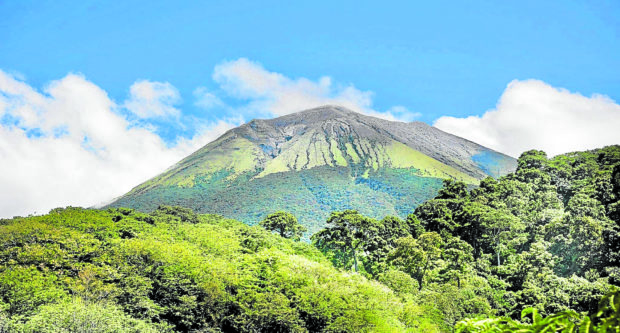Phivolcs records increased volcanic activity in Kanlaon

IN CALMER TIMES Mt. Kanlaon, one of the country’s active volcanoes, is calm in this photo taken in February 2022. Government volcanologists have been closely monitoring the volcano due to increased volcanic activity recently. —RONNIE BALDONADO /CONTRIBUTOR
MANILA, Philippines — The state seismology agency reported an increased seismic activity at the Kanlaon Volcano in Negros Island on Wednesday.
According to the Philippine Institute of Volcanology and Seismology (Phivolcs), 15 volcanic-tectonic earthquakes were recorded early Wednesday morning, and had energies ranging from Richter local magnitude (ML) 1.4 to 4.2
“A total of fifteen (15) volcano-tectonic or VT earthquakes have been recorded by the Kanlaon Volcano Network between 3:58 a.m. and 5:00 a.m., 22 November 2023. These earthquakes ranged in energy from ML1.4 to ML4.2 and occurred at depths of 0 to 2 kilometers beneath the northern flank of the Kanlaon range,” Phivolcs said.
Volcanic sulfur dioxide emissions have also increased from May this year. According to the agency’s latest measurements on November 14, sulfur dioxide emissions reached 1,017 metric tonnes/day.
READ: Phivolcs records 113 aftershocks following Davao Occidental quake
Article continues after this advertisement“Volcanic sulfur dioxide (SO2) gas emission from the summit crater has been elevated since 1 May 2023, averaging 570 tonnes/day since then, with the latest SO2 measurement on 14 November 2023 averaging 1,017 tonnes/day,” it added.
Article continues after this advertisementCurrently, the volcano is on Alert Level 1, which indicates a “low level of volcanic unrest.” However, Phivolcs said that it may raise the alert level to No. 2 if the volcano displays increasing unrest.
READ: Magnitude 6.1 quake strikes waters off Balut Island in Sarangani
The bureau also told the public and local government units to exercise vigilance and caution, as well as for aviation authorities to advise pilots to not fly close to the volcano.
“The public and local government units are strongly advised to be vigilant and refrain from entering the four (4) kilometer Permanent Danger Zone (PDZ) due to increased chances of sudden and hazardous phreatic eruptions occurring without warning,” it said.
“Civil aviation authorities must also advise pilots to avoid flying close to the volcano’s summit as ejecta from any sudden phreatic eruption can be hazardous to aircraft,” it added.